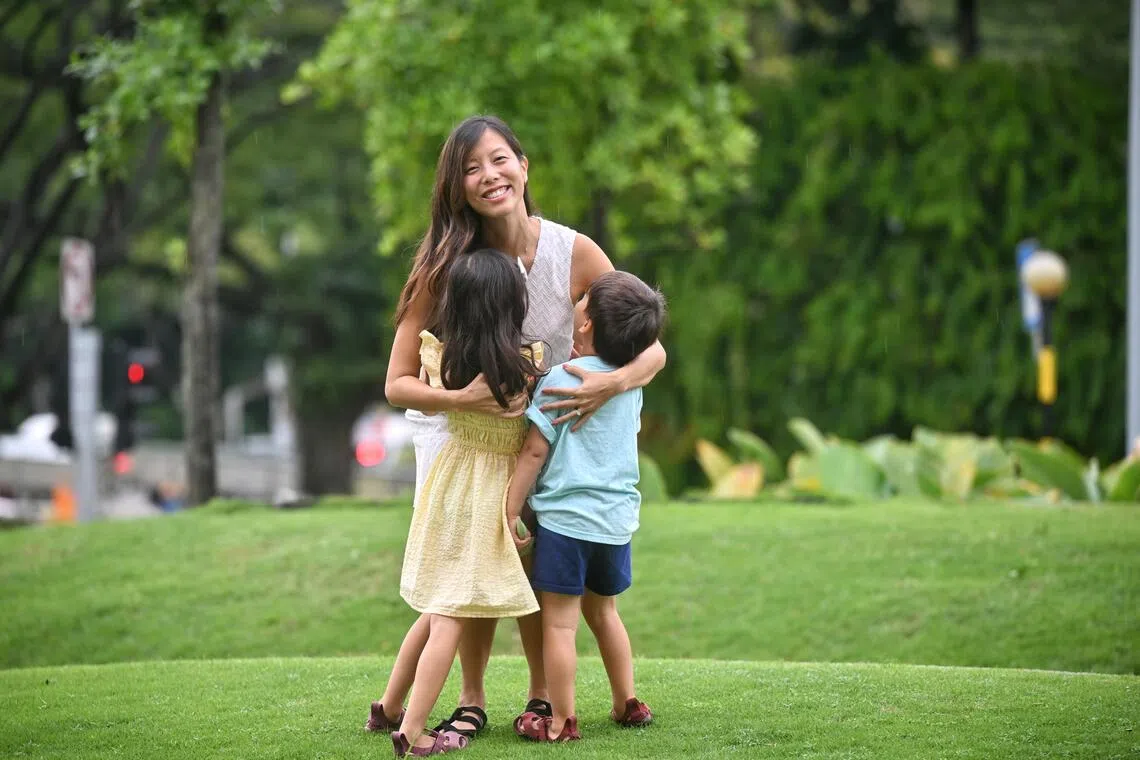She looks at her children’s small hands to calm herself down before disciplining them
Sign up now: Get ST's newsletters delivered to your inbox

Certified parent educator Kelly Tay, mother of a four-year-old boy and six-year-old girl, teaches her children about their misbehaviour only when everyone is calm.
ST PHOTO: ARIFFIN JAMAR
- Kelly Tay uses visual reminders like her children's small hands to regulate her emotions and avoid reacting from a place of anger.
- Desmond Lee stated that excessive physical discipline is abuse. Social workers encourage alternatives like the 3 R's: regulate, relate, and reason.
- Lee Jia Ai recommends clear boundaries combined with withdrawing privileges, alongside self-regulation for parents to manage their own stress.
AI generated
Singapore - When Ms Kelly Tay, 38, feels anger and frustration surging within her when her two young children misbehave, she takes a step back to pause and calm herself by looking at her children’s hands.
“When I look at how small my kids’ hands are compared with mine, it is a visual reminder that their brains are not fully developed yet,” said the mother of a four-year-old son and a six-year-old daughter.
“So, I have to calm down first and lend them my calm. If I am shouting or raging, they will shut down or cry even more.”
Ms Tay is a certified parent educator who works with Asian parents to “break generational cycles of fear-based discipline and embrace respectful parenting”.
She teaches her children what is wrong with their actions or behaviour only when everyone is calm – she says children are unable to really listen or learn if they are in distress.
The first steps towards disciplining her children are to regulate her own emotions and to learn more about children’s development, said Ms Tay, who does not use physical discipline.
Ms Lin Xiaoling, director of research and advocacy at the Singapore Children’s Society, said that when children are fearful or in distress, the emotional part of their brain is activated and this blocks access to the part of the brain that facilitates thinking and learning.
This means that even well-intentioned discipline fails to achieve the desired learning outcomes if the child is too fearful or distressed.
While physical punishment may get the child to stop their wrong behaviour momentarily, they do so to avoid punishment, rather than because they understand right from wrong, Ms Lin said.
Social workers interviewed encourage parents not to use physical means to discipline their children, as the line between discipline and abuse can be crossed in the heat of the moment, among other reasons.
On Nov 5, Minister-in-charge of Social Services Integration Desmond Lee said that excessive physical discipline of one’s children will be considered as abuse, in announcing measures to improve safeguards in the child protection system in the wake of Megan Khung’s death.
Mr Lee said: “However, we will make clear that while we respect the role of parents in disciplining their children, excessive physical discipline will be considered and reported as abuse.”
Megan died at the age of four in February 2020, after suffering over a year of horrific abuse by her mother, Foo Li Ping, and her then boyfriend, Wong Shi Xiang.
Ms Lin recommends the “3 R” approach to discipline – regulate, relate and reason.
First, parents have to help their children regulate their feelings and calm down, so that their brains are in a state where they are able to learn.
The parent has to listen and relate to the child, and validate the child’s feelings.
“This helps to build trust, opening doors for the child to share thoughts and feelings, and allowing deeper insight into what the child needs,” Ms Lin said.
When the child is calm and feels connected to the parent, the parent can use reason to help the child reflect on his or her behaviour, learn from it, and explore making better choices.
Ms Lee Jia Ai, deputy head at Allkin Family Service Centre@Cheng San 445, said parents can discipline their children using strategies such as setting clear and consistent boundaries, and withdrawing privileges, like activities the child enjoys.
“What matters most is that parents explain clearly why these privileges are being withdrawn, and apply the consequences consistently. This helps children understand the link between their actions and outcomes, which promotes accountability and learning,” she said.
Ms Lee added that self-regulation, or the ability to manage one’s thoughts, emotions and actions calmly and constructively during stressful situations, is vital for effective parenting.
For parents who are struggling to do so, she urged them to talk to a professional or someone, instead of dealing with it alone.
“Parenting is undeniably challenging, and just like anyone else, parents need care and compassion too. When parents are constantly operating under high stress, it becomes difficult for them to respond to their children with patience, empathy and clarity,” she said.



